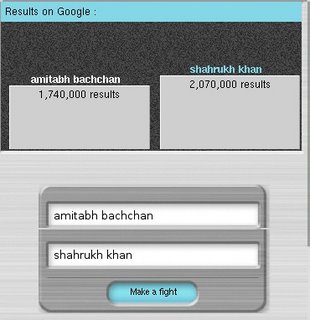I went to watch this film with very little expectations. That is because i had read Amitabh saying in one of his interviews that this should have been a short documentary and not a full featured film. after watching the film, i must say that he couldn't have been more wrong than that(assuming that the interview was a reliable one).
This particular film was closest to my sensibilities, which only a very few films are. The film was very opiniated one, which means it was that much more difficult to get the nod of a large section of the audience. There are only a few films in which I felt satisfied after every new development in the story and never thinking that it could have been better than that. What more, we were told at the end of the screening(yes, it was a special screeing by
Moving Images) that the writer
Mahasweta Devi, on whose book this film is based on, had felt that the film version is better than even her book version. Kudos to
Govind Nihlani!
The film deals with the complex issue of naxalite upsurge in the West Bengal during the 1970s. Following are the keypoints of the film from my point of view:
1. Young lads from rich and affluent families also became part of the naxalite movement(HKA has a similar theme, in the Bihar setup) hoping for a better future for the neglected sections of the society, carrying a dream to change the entire structure of the world, bringing peace and prosperity to everyone.
Jaya Bachan's youngest son, played by
Joy Sengupta, plays the character of one such guy.
2. From the point of view of the youth, they are doing the noble deed of cleaning up of the system. From the point of view of the system and the administration, these people are nothing but the criminals. Interesting angle added to this is the point of view of the family and the relatives of such students-turned-naxalites: Joy's father(
Anupam Kher) and his siblings treat him as a criminal and consider him to be an embarrassment. The father tries to completely erase him from his memory once he gets killed in the police encounter.
3. Jaya Bachan represents the other side of the society - the part which has no point of view at all. They don't understand what is right or wrong with the system, what is meant by standing against it, what are the rights of the common people and how they are flouted by the adminstration. She loves her child more than anything else but yet fails to understand, or even know what his dreams are. She donned this role with perfection and she looks nothing but the character itself.
4. Seema Biswas represents that part of the society which pays for the sins committed by the others. Her family has one son - a naxalite, and three daughters. As the son would be the torch bearer for the family in time to come, he is the one who is properly fed and properly educated by the parents. With the hope that he will get a job for himself as soon as he completes his education and will then take the burden of supporting the family on his shoulders and will marry off his three sisters. Its a pitiable condition in this scenario for them to lose him after investing in him for 20 long years. The family is deep in the trenches with the father not being alive anymore, mother not in the health to take up domestic work at others' houses, the family having to meet the expenses with the tution earnings of the eldest daughter and by selling off the home utensils. Who will marry off the daughters now? How would they be even surviving for very long? what wrong did they do for having to face all these troubles?
5. The cunning way in which the politicians deal with the naxal upsurge is beautifully handled by the director. No point in explaining all that here though; the moral of the story is that you always are at a disadvantage when you chose the violent path. You don't even know to which side you belong. To give a real fight, especially in a democratic setup, you have to be in the system; otherwise you are doomed.
6. The oppurtunity to have a second thought on what went wrong for them with the naxal movement, why they have failed, should they have done anything differently etc was given to
Nandita Das's character. It was a real pleasure to see such a young actress(it was one of her first films*) putting up with such an impressive performance. The scene where
Milind Gunaji interrogates her was by far the best in the film. Her first interaction with Jaya Bachan raises a lot of thought-provoking questions which do not have too many obvious answers. These two scenes take the film to a completely different level.
7. The engagement party of Jaya Bachan's daughter is just another high point of the film. It has humour, it has satire, it has pain and it comes at an important phase in the film.
8. The film ends with Raghu's dream (almost) coming true. The difference: his own mother, Nandita Das and the other colleagues now work by being within the system. His mother works on the documentation of the human rights. Nandita Das works with the tribals. so on and so forth.
The film is so strong in the ideology yet its presented in such an interesting and entertaining format, a film couldn't get any better than this, isn't it?
*The credits of the film suggest that it was the first film by Nandita Das. But she had already worked in
Fire(1996) before this film.
$ I used the names of the actors rather than the characters as I have forgotten almost all the character names.


















